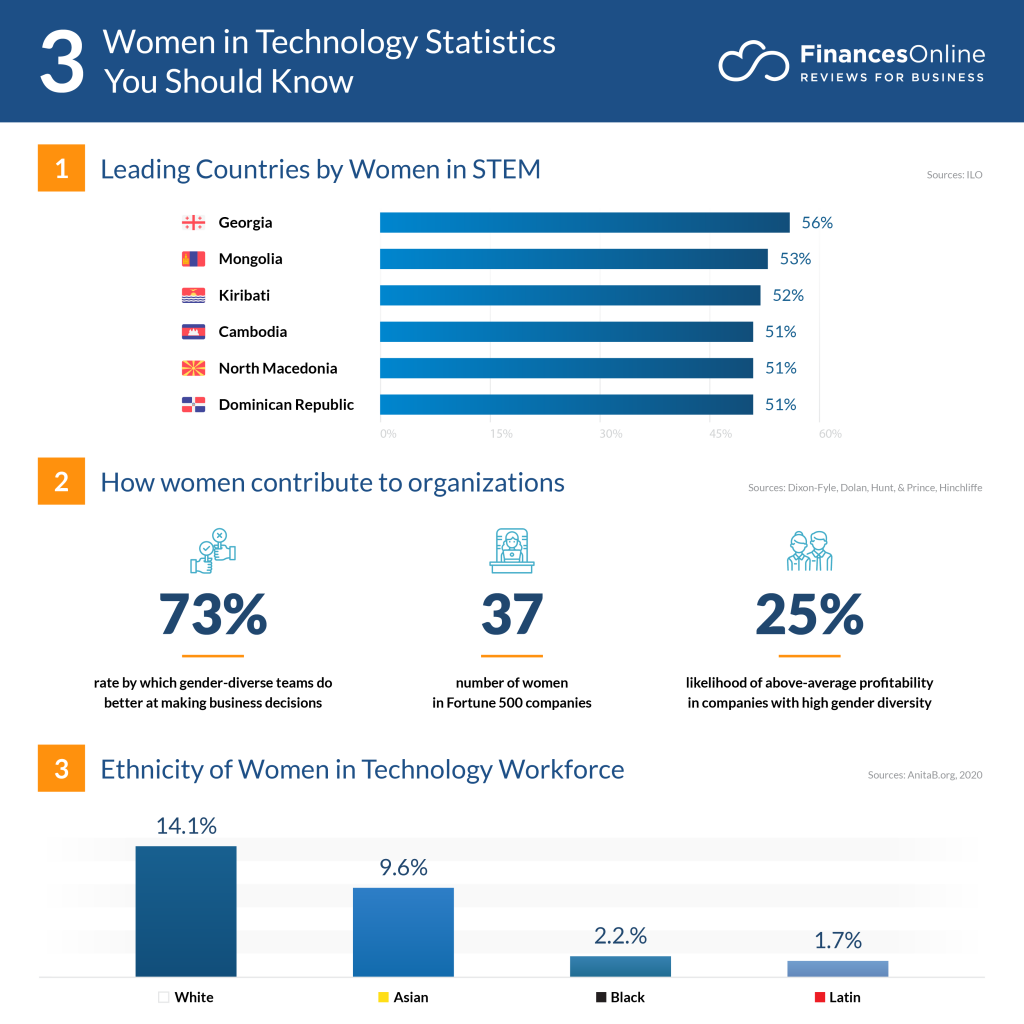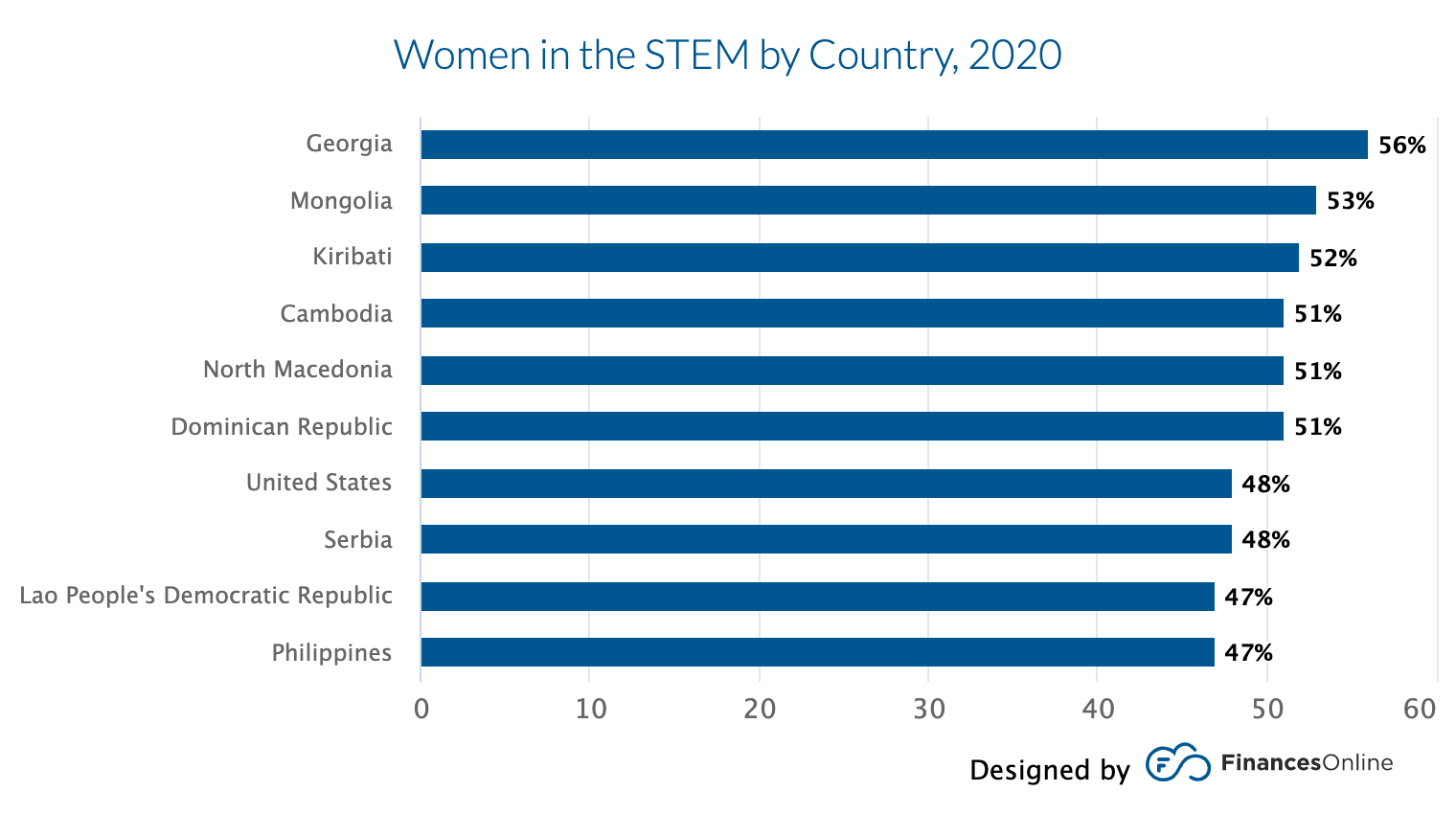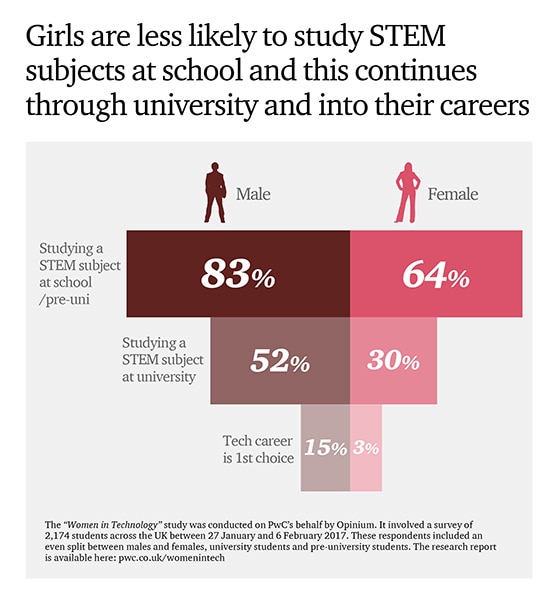Lets look over some stats about women in tech
Source: Next Generation Recruitment (Ireland):
What countries are leading the way and getting it right?

Source: FinanceOnline
The countries leading the way on addressing the gender gap in tech are no the countries that you might immediately think of. The info-graphic on the left (above on mobile devices) shows the results of a study carried out by FinancesOnline. The 6 countries in the info-graphic all have around 50% of their tech workforce made up of women, with Georgia leading the way with an impressive 56%
Figure 2 shows how companies and teams that are diverse and have women in them, outperform teams without women in them.
This info-graphic shows the the top 10 countries in the world where women are in STEM. It is an extension of the graphic above. If you were asked to list the top 10 countries where the women in tech gender gap was address would you have come up with the same list?

Source: FinanceOnline
Employers are doing a lot to try and recruit more women but the numbers aren't there. Why?

Employers can only interview and recruit what is in front of them. Tech employers advertise the majority of their roles. Look at any tech job that's advertised and you will see the majority of companies have a diversity statement stating clearly they don't discriminate on any grounds, including gender and they actively encourage applications from women.
The problem lies with not enough women going into stem/tech at a young age
The info-graphic on the right (above on mobile devices) shows research results carried out by PwC (Price Waterhouse Coopers)
As we can see from their research there is a glaring disparity as early as highschool with 83% of boys choosing to study a STEM field and only 64% girls, a 19% difference despite the fact that girls are consistently achieving better grades than boys.
At University this imbalance continues to grow with 52% of men studying STEM while the number of women has more than halved from 64% down to 30%
However the biggest drop off is after University when men and women enter the workforce. 15% of men will see a career in STEM as their first choice, with women that has fallen to as low as 3%! A staggering 90% decrease from the number of women who studied STEM at university.

Source: PwC
Did you know the field of computing actually used to be dominated by women.
Source: BBC
But there are no women in tech to look up to right?........Wrong!
There is a current narrative that there are no successful women in tech to look up to, and a misconception that women don't succeed in tech. This is not true and if anything, this narrative could be contributing to the number of girls/women who are dropping out of STEM at an early age.
Below is a list of women who have not only succeeded in tech, but have reached the absolute pinnacle and are either currently, or have recently headed up billion-dollar multinational tech companies.
- Sheryl Sandberb- COO of Facebook
- Ginny Rmetty - CEO of IBM
- Ruth Porat - CFO Google
- Julie Sweet - CEO of Accenture
- Susan Diane Wojcicki – CEO of YouTube
- Reshma Saujani – Founder of Girls Who Code
- Safra Ada Catz – CEO Oracle & billionaire
- Marissa Mayer - Formerly president & CEO of Yahoo
- Meg Whitman - Previous president & CEO of Hewlett Packard
- Ursula Burns - CEO of Xerox from 2009 to 2016, the first among black women to be a CEO of a Fortune 500 company
- Peng Lei - Co founder of Alibaba, also a billionaire
- Ellen Pao - Former CEO of Reddit
- Whitney Wolfe Herd - Founder and CEO of Bumble, also a billionaire
- Mary Barra – CEO of General Motors
- Anne Wojcicki – CEO & founder of 23andMe
- Corie Barry – CEO of Best buy approx 100,000 employees, $47 billion in annual revenue
- Sharmistha Dubey - CEO of Match Group, the largest global portfolio of dating services including Tinder, Match.com, Meetic, OkCupid, Hinge, PlentyOfFish, Ship, and OurTime, totalling over 45 global dating companies.
- Jilliene Helman - CEO of RealtyMogul, a billion dollar FinTech company focused on investing in commercial real estate.
How do i make the move into tech?
If more support were offered to girls/women early on in their STEM journey then we wouldn't have the imbalance we see today in tech. Also if a woman was considering a career change, the next question is where do i start? What is the road map?
This project aims to help address this issue. On this site women who are currently working in the field of tech can create a profile free of charge and volunteer to help mentor and assist any young woman who is early on in her tech journey.
Women who are currently in school, in university, or who are very early on in their tech careers can also create a profile and brows to see what mentors are currently available that might be able to offer help, advice and mentoring for the field that they are interested in.
What are the rewards of a career in tech?
Gemma Church from women in tech wrote recently “Tech is probably the only field that allows you to work on anything from anywhere”
Standard benefits that you can expect with most tech companies are:
- Work from home and hybrid working environments (No more long commutes)
- Flexible hours, not glued to a desk from 9am until 5pm (Flexible working allows for a better work. life balance)
- The majority of tech companies offer maternity & paternity leave on full pay
- Private medical health insurance
Rather than write a whole list about how rewarding a career in tech can be for women, why don't you hear from the women themselves who have already landed that tech job and are working in the field.
Women At Amazon
Source: Amazon:
Women At Huawei
Source: Amazon:
Women At PwC
Source: PwC
Women In Tech
Source: le wagon (YouTube):